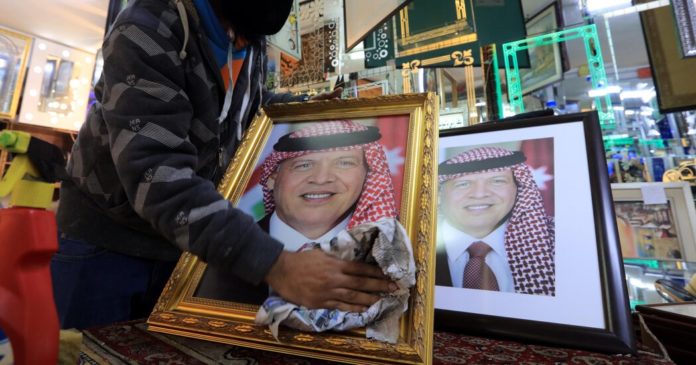AMMAN, Jordan — Employees and associates of a Jordanian prince accused of plotting to undermine the government were still being held incommunicado by security forces on Tuesday, their relatives said, casting doubt on earlier claims by the royal court that it had resolved an unusually public and bitter rift.
The royal court released a statement less than a day ago saying that the prince, Hamzah bin Hussein, had pledged his loyalty to King Abdullah II, his older half brother. But Prince Hamzah’s chief of staff, Yasser Majali, and Mr. Majali’s cousin, Samir Majali, are still being held in an unknown location, according to their family, which comes from one of Jordan’s main tribes.
The two were arrested on Saturday, the day that the government claimed that the prince had been involved in a plot to destabilize the kingdom’s stability.
“Every time we call someone, they say we will get back to you,” said Abdullah Majali, Yasser’s brother, in an account corroborated by a second senior member of the Majali family. “We still don’t know where they are.”
Prince Hamzah’s whereabouts was also unknown as of Tuesday morning. And the Jordanian government issued a gag order on Tuesday that barred Jordanian news outlets and social media users from discussing the case.
The developments are the latest twists in a royal feud that exploded into public view over the weekend, upending the family’s reputation for discretion and the country’s image as a rare haven of stability in a turbulent region.
Jordan is a key partner in regional counterterrorism missions, a base for American troops and aircraft, and a major recipient of American aid. Bordering Syria, Iraq, Israel and the Israeli-occupied West Bank, it is considered an important interlocutor in regional diplomacy — and a linchpin of any potential Israeli-Palestinian peace negotiations.
Over the weekend, the Jordanian government arrested several of Prince Hamzah’s staff members and associates, and accused the prince himself of working with a former senior royal aide and cabinet minister, Bassem Awadallah, to undermine the country’s stability.
The government’s statements hinted that those arrested had been involved in a foreign-backed coup attempt, but stopped short of using such direct language.
Prince Hamzah fired back with two videos in which he excoriated his brother’s government, but denied involvement in any plot and said he was being held under house arrest — an allegation the government denied.
By Monday night, tempers seemed to have calmed, as the royal palace released a statement written in the prince’s name in which he pledged to “stand behind His Majesty in his efforts to protect Jordan and its interests of the nation.”
But the uncertainty on Tuesday about the whereabouts of the Majalis and the prince himself suggested that tensions had not completely dissipated.
The government’s narrative was also placed under question on Tuesday by the leak of a recording of a conversation last week between the prince and the head of the Jordanian military, Maj. Gen. Yousef Huneiti.
In the recording, which was obtained by The New York Times and other media outlets, the general appears to acknowledge that the prince had not personally moved against the king, but had instead attended social gatherings where criticism of the government was made by others.
With coronavirus-related deaths on the rise in Jordan, the prince’s allies say he had attended more wakes and funerals than usual.
“During these meetings, there was talk about the government’s performance and the performance of the crown prince,” General Huneiti said, according to the recording.
“This talk came from me?” replied Prince Hamzah.
“No,” the general said. “From the people you were meeting with. We both know, sir, this crossed the red lines. People have begun speaking out more than they should. Therefore, I hope his royal highness abides and refrains from attending such occasions.”
The Majali family expressed doubt that any relatives were ever even in a position to support a supposed plot to destabilize the kingdom.
Samir Majali had met just a few times with Prince Hamzah for lunch, in his formal capacity as a tribal elder, said Samir’s cousin Hisham Majali.
Yasser had been convalescing at home after a heart attack followed by a bout of the coronavirus, and had not been to work in several weeks, his brother, Abdullah Majali, said.
Neither man had a connection to Mr. Awadallah, their relatives said.
“They don’t even know him,” said Abdullah. “It’s unacceptable that they would link their names.”
Many Jordanians also believe that Prince Hamzah himself and Mr. Awadallah would be unlikely co-conspirators. Prince Hamzah is closely tied with Jordan’s Indigenous tribes, like the Majalis, while Mr. Awadallah, a former head of the royal court, is one of the many Jordanian citizens from families of Palestinian origin.
The pair have different views on economic and political policy. And while Mr. Awadallah was often a target of government critics while he was in office, the prince presents himself as a proponent of good governance.
Source : Nytimes












